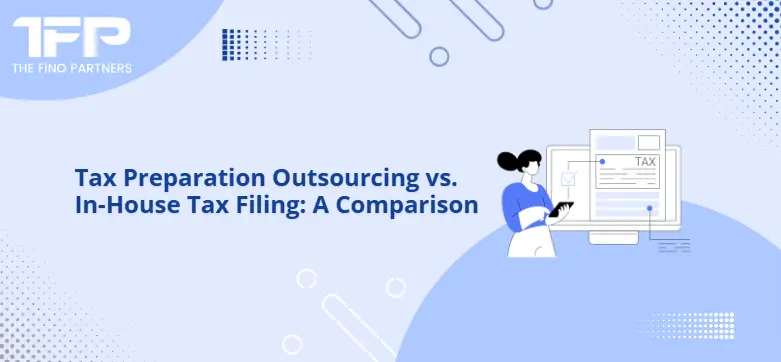For both individuals as well businesses, paying taxes is a vital component of financial management. Choosing to perform tax preparation internally vs outsourcing can have an enormous impact on your costs, accuracy, and efficiency. Outsourcing provides the use of specialist knowledge and resources, but in-house filing of taxes offers control and familiarity. The contrasts, advantages, and disadvantages of these two strategies are looked at in this article to assist you in deciding which is more suitable to what you need.
Why should your business delegate outsourcing tax preparation?
1. The cost-efficient way
Cost efficiency is among the most alluring benefits to outsourcing tax preparation. Salaries, bonuses, training, and administrative costs for technology and office space are all needed when hiring internal employees. Businesses can obtain work experience without having to pay these fixed fees by opting to outsource tax preparation services. Significant cost reductions are achievable because of service providers' variable pricing techniques, which are typically adapted to the volume and complexity of the work.
2. The straightforwardness of obtaining expertise
By hiring qualified workers with extensive understanding of tax legislation, regulations, and industry norms for preparing the returns for you, you can be sure that your taxes will be handled properly. By staying abreast of the most recent tax laws and compliance requirements, these professionals minimize the possibility of errors or fines. Companies that contract out the preparation of tax returns services have access to modern tools and technologies often unavailable to in-house teams.
3. Being time-savvy
Filing taxes requires a lot of time and can take your focus away from your main company tasks. You may assign this task to experts by outsourcing tax preparation, which opens up precious time for strategic initiatives. Outsourcing ensures you don't get mired down in paperwork, whether you're working your business or concentrating on personal financial planning.
4. The two factors: Flexibility and Scalability
Businesses frequently see a rise in burden during the busiest tax seasons. The scalability needed to effectively manage such variations is offered by outsourced tax preparation services. In order to satisfy rising requirements, service providers can instantly modify their resources, ensuring compliance and timely being submitted. It is difficult to achieve this degree of flexibility with an internal staff.
5. Improved Accuracy and Security
Data security is the primary objective for expert tax return preparation outsourcing businesses, who use encrypted systems that are secure servers to protect sensitive information. Their experience and tools also help reduce the likelihood of errors, ensuring that tax filings are accurate and compliant with IRS standards.
Going the in-house way: The pros and cons of this method
Advantages:
1. The authority is not lost
Businesses and individuals enjoy total control over the tax preparation process when they manage taxes domestically. For people who prefer to have immediate authority over sensitive financial data, this may be beneficial.
2. Customisation
Internal teams may alter tax preparation techniques to fit certain business needs and tastes, ensuring an individualized approach.
3. Instant Access
Financial data is readily available for review or auditing when an internal team is in place. You do not require to wait for updates or depend on communication from outside.
Drawbacks:
- Pricey Keeping an internal staff requires a large investment in infrastructure, software, and training, which can put a strain on resources, particularly for small businesses.
- Limited Proficiency Internal teams might not have the particular knowledge needed to handle intricate tax laws or exploit all of the credits and deductions that are available.
- The in-house approach demands substantial time and effort, which may hinder productivity in other areas of business.
The main pointers to consider: Outsourcing vs In-house
|
Aspect |
Outsourcing Tax Preparation |
In-House Tax Filing |
|
Cost |
Cost-effective, with flexible pricing plans |
High fixed costs (salaries, training, etc.) |
|
Expertise |
Access to seasoned professionals |
Limited to the knowledge of in-house staff |
|
Time |
Frees up time for core tasks |
Time-intensive |
|
Scalability |
Highly scalable to meet seasonal demands |
Limited scalability |
|
Security and Accuracy |
Secure systems, reduced error risks |
Risk of human error, variable security levels |
Making a smart decision for the future of your business
Your unique needs, financial standing, and the complex nature of the tax burden will all play a role in choosing between in-house and outsourced tax preparation services. Due to its price and reliability, outsourcing frequently helps small businesses as well as people with clear returns more than others. Bigger businesses with specialized finance divisions, however, could favor the control associated with internal budgeting.
Also Read:- Top Tax Preparation Outsourcing Companies in the USA
Conclusion
The choice of location between in-house tax filing and tax preparation outsourcing ultimately reduces down to your priorities. The advantages of outsourcing tax preparation, including the effectiveness of costs, expertise, flexibility, and time savings, are difficult to overlook, even though in-house filing affords control and familiarity. You may make an informed choice that maintains compliance and improves financial efficiency by meticulously evaluating what you want.




























